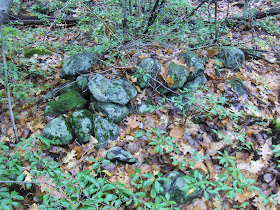Anyway, I found an excuse to go back there: I had not explored the north slope of South Manoosnoc, nor the verge of the swamp at its base. I guess I made a mistake because I traversed that slope too far uphill and saw almost nothing till I got back to the lowlands.
We'll have a look at some pictures. Let me mention that I avoided the main sites (except at F) and deliberately went places that seemed less promising - because I hadn't been to them.
I got off Mt Elam Rd and went walked parallel with it, but following closer to the power lines. Here was earthen mound at A:
An earthen mound is an unusual find. Especially here, in an area full or stone mounds. I knew it was dirt, cuz it was soft when I poked a toe into it. Then back on the Rd: here is where we cross beneath the power lines:
We glimpse some larger mounds but have other goals for the moment.
Tim MacSweeney will know why I could not resist going off in an inviting direction here:
But there were only scraps back there and I continued up and across and down over towards B. The hillside:
Make no mistake about "Notown". It was a serious, ceremonial, place.
So I was exploring along the verge of the swamp back there. I am a bit confused by the map because I think there is another road in there that goes south towards South Manoosnoc - the way to its summit. I was on that road and cut back towards the swamps at an elbow in the road. Poking along, I see this:
I have had good luck, so I went through the opening with optimism. At B. And immediately there was the rock pile: covering the entire top of the little knoll. Hard to photo, this video captures as much as there is to see:
Iconic Leominster:
There was another mess atop this bump but the wall was quite eye catching (mound to the right):
What is this?
In the Manoosnocs you are never far from moose.
Here was an isolated pile next to an old trail leading up from the swamp:
Then we start a long slow traverse of the lower north slope of South Manoosnoc. Nothing much in there. An occasional rock on rock, and occasional small pile. At the power lines, this impressive wall caught my eye:
Look closely and notice a couple of "hollows" in the wall - a couple places where there were no rocks. Traversing...(C).
Then I headed back down towards the edges of the wetland. I came across a curiously steep little bump in the woods (D), that almost seemed artificial. I climbed it dutifully, and only noticed one thing on the way down: a crater dug into the sandy side, with a stone lined entrance:
It doesn't look like much but it was a real feature. Just across a little valley was this pile, facing the crater:
It looked familiar and I soon realized it was the edge of one of the more interesting "sites" I have found here in the past. Certainly the most obscure - since it is not easy to get to D.
Then I was crossing a swamp, with difficult going through the laurel, and stumbled on a small group of piles with quartz at E. These seemed like old marker piles.
Pretty substantial. I was struck by how the landscape must be totally different not from when these piles were functional.
Then it was back to the edges of the main site, at F:
(detail of just in front of the the log )
A bit like a quartz manitou Mavor writes about in Falmouth. A thoroughly pleasant walk, with something for everybody - from mounds to standing stones.



























No comments :
Post a Comment